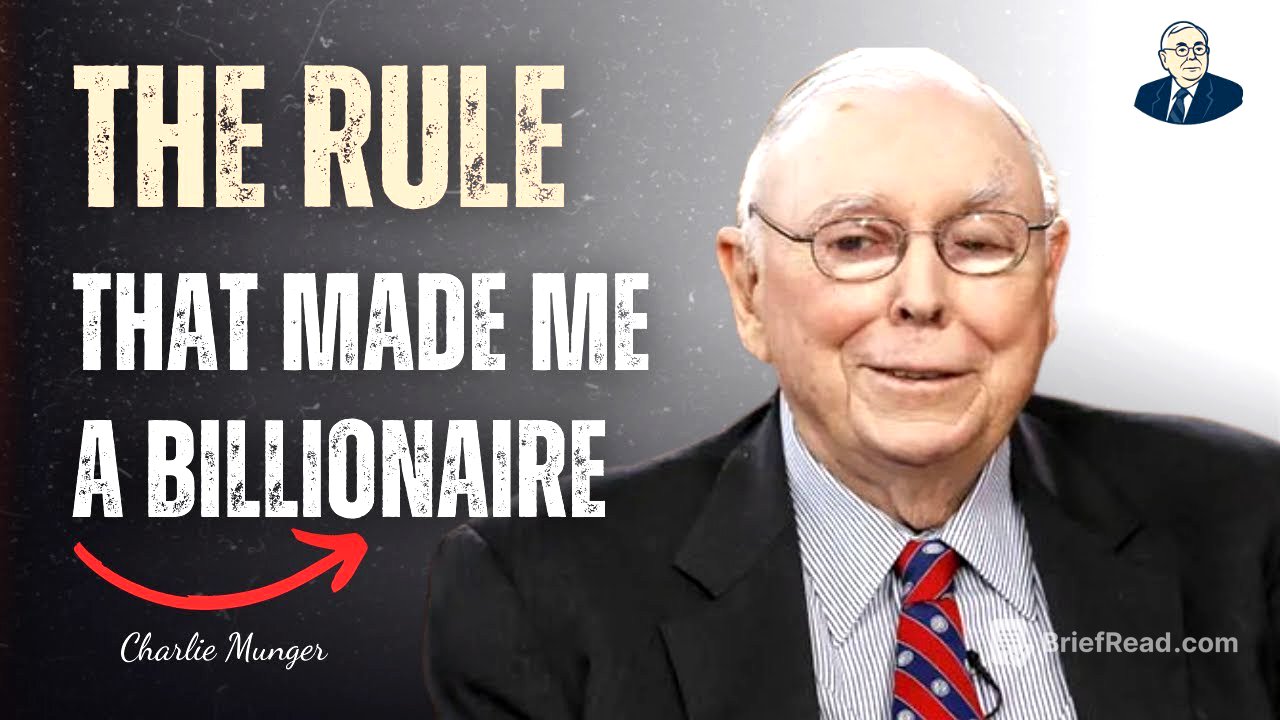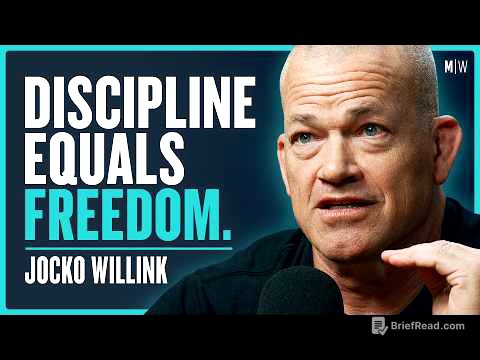TLDR;
This video emphasizes the importance of avoiding losses over chasing high gains in investing. It stresses the significance of prudence, discipline, and understanding one's limitations to achieve long-term financial success. The key takeaways include avoiding debt, resisting envy, understanding the business and management incentives, and learning from historical financial crises.
- Prioritize avoiding losses over seeking quick gains.
- Understand your circle of competence and avoid overconfidence.
- Focus on long-term ownership rather than short-term career gains.
- Learn from history, especially the lessons of the Great Depression.
Introduction: The Key to Compounding [0:00]
The fundamental rule of compounding is to avoid interrupting it by losing money. While seemingly obvious, many investors fall victim to this pitfall. The key to surviving and thriving in the market lies in avoiding stupidity rather than chasing brilliance. The speaker reflects on decades of market experience, highlighting that those who avoid significant losses are the ones who ultimately succeed.
Lessons from the Great Depression and 1970s Inflation [0:42]
Growing up during the Great Depression taught the speaker the importance of avoiding debt and staying conservative. Families were ruined not by bad luck, but by overconfidence and excessive borrowing. Similarly, during the inflation of the 1970s, many lost fortunes by being overly optimistic and leveraged. Cautious approaches, like avoiding debt and fashionable trends, allowed compounding to work effectively over time.
The Pitfalls of Chasing Quick Wins and Envy [2:07]
The desire for quick and substantial gains often leads to wealth destruction. The speaker warns against the allure of "hot stock tips" and emphasizes that not losing is more critical than winning big. Envy is identified as a particularly destructive emotion, driving investors to take unnecessary risks to keep up with others, often leading to poor investment decisions. The speaker advises focusing on one's own game and avoiding the trap of comparing oneself to others.
Avoiding Stupidity: Learning from Mistakes [7:08]
The speaker shares personal investment mistakes, such as buying cheap, low-quality companies (cigar butts), which ultimately cost more than they were worth. The key lesson is that the price of avoiding stupidity is far lower than the cost of fixing it. Investors should avoid obvious disasters by not borrowing excessively, not investing in what they don't understand, and not trusting those who sell advice for profit.
The Dangers of Overconfidence and the Importance of Humility [10:25]
Overconfidence is a significant reason why people lose money in the market. Many investors overestimate their knowledge and act accordingly, leading to poor decisions. The speaker emphasizes the importance of admitting what you don't know and staying within your circle of competence. Humility, rather than arrogance, is crucial for avoiding significant losses.
Thinking Like an Owner vs. an Employee [13:46]
Many people lose money because they think like employees focused on short-term gains rather than owners concerned with long-term value. Careerism leads to playing it safe in the wrong ways, prioritizing job security over the health of the business. The speaker advises looking at the incentives of those running a business and determining whether they are acting like owners or careerists.
Lessons from the Great Depression Revisited [17:18]
The Great Depression provided stark lessons about the dangers of debt and the importance of cash. Those who lived within their means and avoided excessive borrowing were able to survive and even thrive during the crisis. Resilience and prudence are more important than brilliance in navigating tough times.
Avoiding Debt, Drama, and Dumb People [20:38]
To stay rich, or at least avoid going broke, one must avoid debt, drama, and dumb people. Debt is a loaded gun that can lead to insolvency, while drama wastes energy and clouds judgment. Surrounding oneself with competent, honest individuals is crucial, as bad partners can ruin a business faster than a bad market.
The Power of Discipline and Patience [23:52]
The speaker reflects on his partnership with Warren, emphasizing that discipline, patience, and a refusal to do stupid things were key to their success. Trust and complementary skills also played a significant role. The most important thing is to avoid mistakes that could sink the ship.
The Secret to Long-Term Wealth: Survival and Compounding [27:16]
The speaker reveals that he never had a grand plan to become a billionaire; it simply happened by avoiding dumb mistakes and letting compounding work its magic. Patience, rather than excitement, is essential for long-term wealth. The key is to focus on survival and allow compounding to do its work over time.
Final Advice: Focus on Not Losing [30:16]
The secret to not losing money is discipline, not brilliance. The speaker advises living below your means, buying things you understand, and partnering with people you trust. The market is brutal and only rewards those who survive long enough for compounding to work. The ultimate advice is to build your life and investments on survival, not luck.






![The Count of Agumonte Cristo - Digimon: The Movie [To Kill a Delibird April Fool's Edition]](https://wm-img.halpindev.com/p-briefread_c-10_b-10/urlb/aHR0cDovL2ltZy55b3V0dWJlLmNvbS92aS9pNjJCc003R3pJdy9ocWRlZmF1bHQuanBn.jpg)
![[EN] 업계 얘기는 핑계고 ㅣ EP.66](https://wm-img.halpindev.com/p-briefread_c-10_b-10/urlb/aHR0cDovL2ltZy55b3V0dWJlLmNvbS92aS85ejNIWWxGY2M2US9ocWRlZmF1bHQuanBn.jpg)

